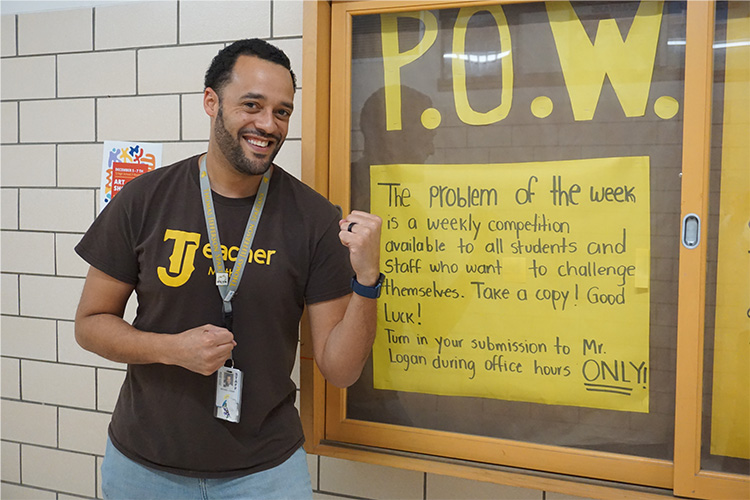
Logan emphasizes his Problem of the Week slogan, POW, with a dramatic punch in the air after every Spartan Edition segment. photo by Farah Djama
A beloved tradition has taken root at Thomas Jefferson High School; one that seeks to captivate both students and staff with mind-bending math questions.
Shown in the Spartan Edition multiple times throughout the week, the Problem of the Week (POW) segment is likely a familiar sight to students and staff at Thomas Jefferson High School. TJ math teacher Michael Logan is the man to commend for this well-known tradition. Logan claimed that he drew inspiration from his own middle school experiences. “I had a teacher who gave us challenge problems from time to time… it was something I always remembered when I started getting good at math, and I just thought it was fun, so I figured students might have a good time with it,” reflected Logan. This spark of inspiration led him to introduce the tradition at Highline Academy in 2010, where he began sharing problems submitted by students, teachers, and community members.
At TJ, the POW has gained popularity rather quickly, with many students and staff participating in this tradition every week. According to Logan, there are already somewhere between 30 and 45 participants for each problem, depending on the difficulty. The POW’s popularity is not dictated by the difficulty of the problems, however, but instead by the range of participants who eagerly take on the challenge, emphasizing the adaptability of the challenges to accommodate various skill levels.
Thanks to its segment on the Spartan Edition, the POW is now an exciting part of many students’ weeks. Freshman Avery Vinlove is a regular partaker in the challenges and a great example of its positive impacts on students. “I like challenging myself and then going and talking to other people about the problem,” he explained. “It’s a challenge that is always achievable.” Although the POW may initially appear irritatingly tedious, there is almost always a solution or approach that is attainable for everyone. “It can be more stimulating than my regular math class sometimes,” Vinlove continued, describing how he thinks it could benefit others if they gave it a try. “We get to have a lot of fun, but I think a lot of people are missing out. They just got more funding; during a celebration there will be a hundred wings for everyone, but only like ten people show up,” he commented. “Doing the problems has made me think, ‘oh yeah, I am pretty good at math.’”
Logan explained that his initial goal with these enjoyable logic puzzles was not only to engage students, but also to encourage community members to push themselves occasionally. “I love it when I get students who are trying it for the first time,” he said. Logan’s favorite thing about the Problem of the Week was its ability to challenge students to give their best effort on tasks they might initially find challenging. “I think it’s really exciting to see that everybody can do math, and when they stop to give themselves a chance to not know the answer right away and take some time with it, they can find success. I love those success stories, like first time winners.”
Despite the confidentiality regarding Logan’s sources for the problems, he was willing to explain to an extent: “I’ve got some math books that I’ll pull them from… I also have some online resources, but I’ve got to be pretty tricky about the way I word it so that they’re not easily found.” Emphasizing the importance of accessibility for everybody, Logan assures that the questions are designed to be solvable with basic mathematical skills. “At their heart, all of these questions you just need basic math for, so I like to pick the questions that just need a lot of logical thinking.” Logan hopes it will enhance students’ critical thinking skills and problem solving abilities.
In regards to the POW, Logan extends a message to students and staff across the school: “I really hope that anybody who’s reading this tries the questions and knows that if you can add, subtract, multiply, and divide, you can do any of the POWs.” The POW tradition at TJ does primarily good things for the community, fostering a culture where every mind is encouraged to explore the wonders of mathematics. After all, if there was a problem, you could solve it, right?